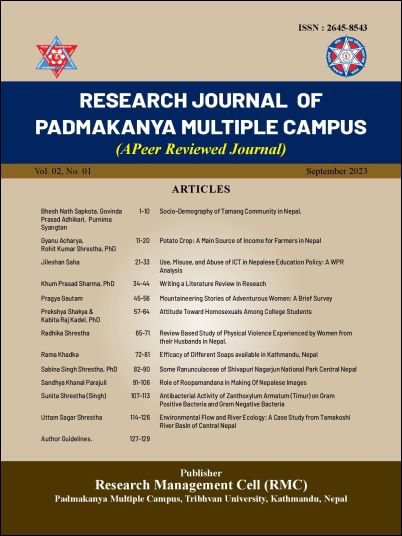Use, Misuse, and Abuse of ICT in Nepalese Education Policy: A WPR Analysis
DOI:
https://doi.org/10.3126/rjpkmc.v2i1.62987Keywords:
ICT, Nepalese Education Policy, Problem, WPRAbstract
Of late, a young school student from Mahottari's Shree Kishor Janta Madhyamik Vidhyalay, has exposed the administration's blatant deceit. He was most concerned about the conspicuous dearth of high-quality education (see this Facebook video at: https://www.facebook.com/watch?v=308978328234703). Surprisingly, the school is egregiously deficient in even the most basic conveniences required for a conducive learning atmosphere. There are glaringly insufficient restrooms, not enough clean drinking water, and even not enough teachers at this facility. The sheer pace at which the internet and digital learning, among other technological advancements, have become so crucial in today’s everyday academic practices, pedagogy and parlance has become alarming. Owing to its efficiency, reliability, and the liberalization of knowledge, as well as its functionality in addressing crises such as the most recent Covid-19 pandemic, ICT has become an essential, irreplaceable tool. Hence, this paper explores the use, abuse and misuse of Information and Communication Technology, highlighting since its inception in 2012. This study explores how Information and Communication Technology (ICT) has been incorporated into Nepal's educational approach. The study applies the "What is the Problem Represented to be?" (WPR) analytical framework to examine the policy's implementation, outcomes, potential, and challenges within Nepal's educational system. ICT adoption aims to switch from traditional to student-centered learning by 2018 to increase educational access and quality. The report underlines persistent policy implementation, teacher ICT training, public-private partnerships, and community engagement as ways to preserve the use of ICT in education. It exhorts decision-makers to ensure policy objectives are carried out effectively and encourages resource allocation to address these problems. It also emphasizes how ICT may revolutionize schooling. The study uses a thorough WPR analysis to look at how ICT has been incorporated into Nepal's educational policy, highlighting challenges, inconsistencies, and workable solutions to make the most of ICT's potential to improve educational quality and accessibility.




